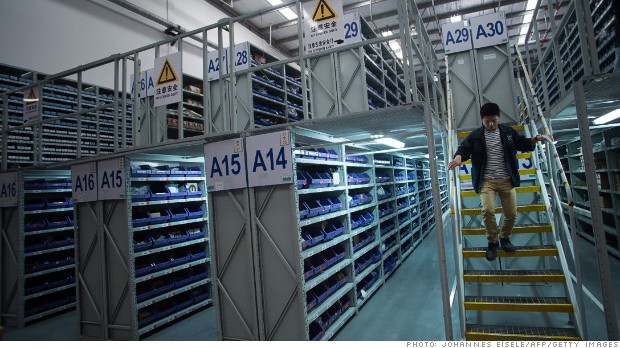 A storage facility in the Shanghai Free Trade Zone.
A storage facility in the Shanghai Free Trade Zone. HONG KONG (CNNMoney)
But many analysts say the trade zone has fallen well short of expectations.
"It's great talk by [Premier Li Keqiang] and a lot of senior government officials, but there's no execution," said Shaun Rein, managing director of China Market Research Group in Shanghai. "Nobody knows what you can do."
The zone is located on a 29-square-kilometer patch of land on the outskirts of Shanghai. At its core, the zone is a tax-free trading hub, but it was also supposed to attract foreign investment and introduce currency reforms that would make the yuan a viable alternative to the dollar and the euro.
While the project is thought to still enjoy the support of Beijing, reforms have been slow to materialize. On the thorny issues of how to loosen capital controls and liberalize interest rates, almost no progress has been made.
Dai Haibo, the zone's de facto head, stepped aside in September, reportedly the victim of a graft probe.
"I think that [the Shanghai Free Trade Zone] was oversold. And in many ways, it was overbought," said Patrick Chovanec, chief strategist at Silvercrest Asset Management.
Chovanec said that confusion reigns over what exactly can be done in the zone, a problem that has plagued the project from the day it opened.
"I'm confused and I follow it. Maybe there are some lawyers out there who aren't confused, but I doubt it," he said. "I think everyone's confused about exactly what the latest rules that have been promulgated mean in practice."
So far, there are no signs that the Shanghai FTZ holds the key to transforming China's economy in the way that the "special economic zones" pioneered more than 30 years ago by then Chinese leader Deng Xiaoping changed the country's trajectory.
Deng's reforms turned Shenzhen from a small fishing village into a manufacturing powerhouse, and helped turn China into the world's biggest exporter.
CNNMoney: This is why Hong Kong matters
Yet for firms that choose to do business in today's Shanghai zone, there are a few bright spots.
Jianjun Long, a Hunan-based business owner, said he wants to register a rental financing company in the zone because there is less red tape -- he will be able to get his business off the ground much more quickly.
Peng Zhenwei, an economist with the Shanghai-based research firm CEBM Group, says the zone has been targeting low-priority reforms like removing red tape and easing the exchange of goods, rather than capital.
Long, the business owner, agrees. "The flow of currencies is still not as easy as we thought," he said.
For now, many companies appear content to register and open small offices in the zone -- a bet that future reforms will fulfill the project's promise. Amazon, for example, plans to open a single warehouse.
"A foreign company might want to establish some kind of presence in the Shanghai Free Trade Zone, so that if some day actually there's a rule that allows you to do something interesting, you're there," Chovanec said. "You don't lose anything by doing that."
Related: Hong Kong protesters are so freaking nice
First Published: October 6, 2014: 9:36 PM ET
Anda sedang membaca artikel tentang
The Shanghai Free Trade Zone is a dud
Dengan url
http://bugarasakti.blogspot.com/2014/10/the-shanghai-free-trade-zone-is-dud.html
Anda boleh menyebar luaskannya atau mengcopy paste-nya
The Shanghai Free Trade Zone is a dud
namun jangan lupa untuk meletakkan link
The Shanghai Free Trade Zone is a dud
sebagai sumbernya
0 komentar:
Posting Komentar